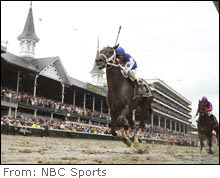 |
| Most of the millions who will watch Saturday's Kentucky Derby would be shocked to find out the work conditions and compensation of the sports' jockeys. |
|
|
|
|
|
NEW YORK (CNN/Money) -
On Saturday, for about two minutes, millions of Americans will watch the most exploited workers in America -- the nation's jockeys.
The 20 jockeys riding in the Kentucky Derby are clearly among the sports' most fortunate. But the majority who finish out of the money will take home less than $60 for the race.
They'll be paid that for engaging in one of sports' most dangerous endeavors, hanging on with only the tips of their toes and a small strap of leather in their hands to a horse going more than 30 mph, while other horses jostle them. On average more than one rider is paralyzed every year.
For the typical race, the jockey's take home pay is so paltry that a baseball beer vendor looks well paid.
"They get $9 per ride and for that they have a better chance of ending up in a wheel chair than they would being in a ring with Mike Tyson," said Wayne Gertmenian, president of the Jockeys' Guild.
Gertmenian has become probably the most hated man in the sport by those who don't ever climb aboard a thoroughbred.
They fear that he's going to become the sports' Marvin Miller, a labor leader giving power to the athletes by shutting down the games being played by the owners.
But he's not fighting for free agency and multi-million dollar contracts for his members.
Instead he's fighting for the type of things for which unionists fought more than a century ago. Workers' comp coverage to compensate those killed or injured on the job. Safer equipment that costs owners relatively modest amounts. Health insurance paid for by those who hire the jockeys.
This is a union the average sports fan should be cheering for, just out a sense of decency. But it's still fighting an uphill battle in most states, including Kentucky.
Right now the key battle is being fought over insurance coverage for jockeys injured or killed while riding in races.
Most tracks in the country only have $100,000 of coverage available, which can be eaten up in hospital bills in a couple of days in the case of a serious injury. Churchill Downs Inc. (Research), the corporation that owns six tracks, including the one where the Derby is run, only announced last month it was getting an additional $1 million of coverage for riders at its tracks.
Pickets in the paddock?
In response to Guild's demands, the industry has mounted a full scale attack on Gertmenian and the union, accusing him of everything from robbing a fund that pays a modest monthly stipend to disabled jockeys to leading jockeys on illegal strikes to threatening to shut down the Derby, the sports' premier event.
Gertmenian insists he didn't advocate two walkouts by some jockeys at Churchill Downs-owned tracks last year, that they were prompted by long-building anger towards the tracks among riders.
"We told them not to do it. They said, 'We don't care. It's our lives at risk,'" he said. "The next thing you know they're being arrested and blacklisted."
Steve Sexton, track president at Churchill Downs, said a successful, full-time jockey can make $100,000 a year (if he wins), and that the risks are known to riders when they enter the sport. But he said he agrees there should be workers comp coverage for riders. He won't comment on the question about the Guild, the walkout at its tracks, or what the Guild plans for the future.
"I'm not quite certain what their agenda is," he said. "We've worked hard in getting resolution on issues in the past. I think the relationship until recently was pretty good."
Gertmenian said the attacks on him and the Guild have done more to unify the jockeys than ever before. The Guild has more than doubled its membership since he assumed leadership in 2001 and now includes close to three-quarters of active riders.
Still he says he's doesn't think the Guild should be considering any kind of walkout -- at least not at this time. The poverty of the members -- he estimates 70 percent are below the nation's poverty line -- is part of the reason. Labor law considers them independent contractors, not employees, in many states. That is another factor working against them.
There are four states -- New York, New Jersey, Maryland and California -- where the jockeys are now considered employees eligible for workers' comp.
The cost is hardly a burden for horse owners -- New York horse owners pay a maximum worker's comp premium of $660 a year, no matter how many horses they race. In addition, purse money (a little less than 1 percent) goes to pay worker's comp premiums.
But so far no one has forced track and horse owners in other states to step up and do right by their jockeys. And so very few have the necessary coverage in case they're hurt.
Here's hoping Gertmenian and his union can end up in the winner's circle. They deserve to be there.
For more on the business of sports, click here.

|